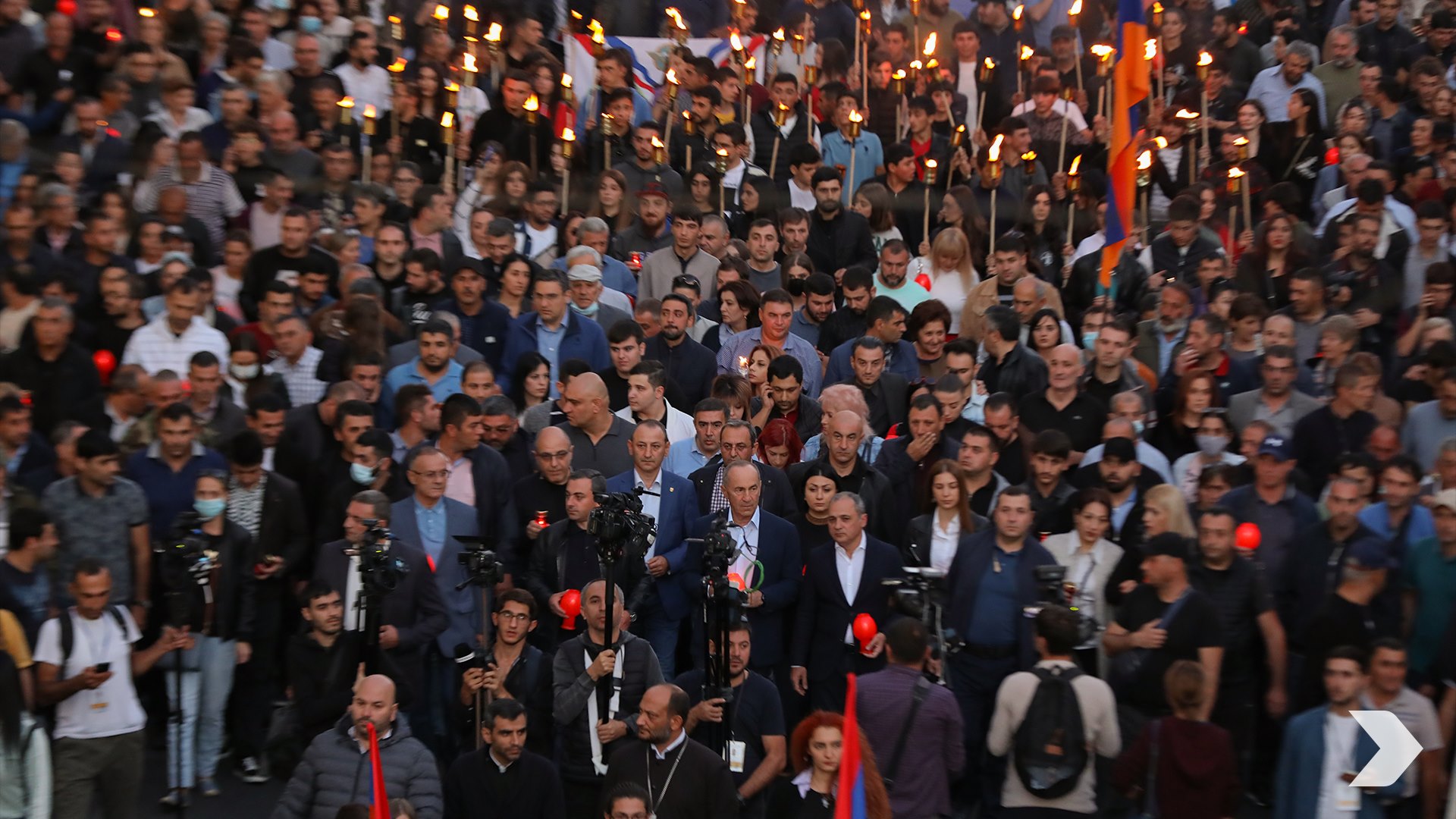
On the one-year anniversary of the start of the devastating 2020 Artsakh War, Armenian officials declared that the conflict remains unresolved while the status of Artsakh is not settled.
The republics of Armenia and Artsakh observed a moment of silence at 11:00AM local time in honor of their war dead.
At least 3,700 Armenian soldiers and 80 civilians were killed during the 44-day war, ignited after Azerbaijan launched a wide scale military offensive along the line of contact with Artsakh. The fate of at least 243 soldiers and 20 civilians is still unknown. An estimated 200 Armenian prisoners of war and civilian captives remain imprisoned in Azerbaijan.
A trilateral ceasefire agreement signed by Armenian PM Nikol Pashinyan, Azerbaijani President Ilham Aliyev and Russian President Vladimir Putin ended military hostilities on November 9, 2020 and ceded large expanses of territory, including four districts outlying Artsakh and the town of Shushi, to Azerbaijan. In the following weeks, Baku also regained control over three other districts outlying Artsakh, displacing thousands of Armenians from their homes. Russia has deployed 2,000 peacekeepers to Armenian-governed Artsakh and the Lachin corridor connecting the territory to Armenia.
The Ministry of Foreign Affairs of the Republic of Artsakh asserted that it would not accept a long-term settlement of the conflict that entails any kind of status within Azerbaijan in a September 27 statement.
“The foreign policy priorities of Artsakh continue to be the international recognition of the independence of the Republic of Artsakh, preservation of its status as a geopolitical subject, de-occupation of the territories of Artsakh, ensuring the continuation of the negotiation process with the full-fledged participation of Artsakh within the framework of the OSCE Minsk Group [and] development of relations with various countries and structures,” the statement reads.
The Armenian Foreign Ministry also called for the resumption of the peace process under the auspices of the OSCE Minsk Group.
“The comprehensive and lasting settlement of the Nagorno-Karabakh (Artsakh) conflict presume the determination of the status of Artsakh taking into account the realization of the inalienable right to self-determination, ensuring of the security of the people of Artsakh, safe and dignified return of the displaced population to their settlements throughout Nagorno-Karabakh [and] preservation of Armenian cultural and religious heritage in the territories fallen under the Azerbaijani control,” a statement released by the Foreign Ministry on September 27 reads.
In contrast to the insistence by Armenian officials that the Artsakh conflict is not resolved, Aliyev reiterated his stance that the conflict has ended during his public address marking the anniversary of the start of the war, celebrated as the Day of Remembrance in Azerbaijan.
“Azerbaijan has restored its territorial integrity. We have resolved the war by military and political means,” he said. “The Nagorno-Karabakh conflict has been consigned to history. There is no administrative territory called ‘Nagorno-Karabakh’ in Azerbaijan.”
In spite of Aliyev’s claims, international mediators have expressed their preparedness to facilitate a long-term settlement of the conflict.
“Active efforts and practical steps are being taken to preserve regional stability and security, overcome the consequences of large-scale clashes last autumn, including assistance in restoring civilian infrastructure, returning refugees and finally resolving the issue of the release of Armenian prisoners,” the Russian embassy in Yerevan wrote on September 27. “Russia will continue its mediation efforts both in its national capacity and within the framework of the OSCE Minsk Group to find a long-term settlement of the Nagorno-Karabakh conflict.”
Russian Foreign Minister Sergey Lavrov told reporters that while the ceasefire has ended hostilities and established regional stability, significant problems remain. According to Lavrov, the OSCE Minsk Group co-chairs from Russia, the United States and France agreed to resume their trips to Artsakh and consult with Armenian and Azerbaijani representatives during their latest meeting.
Igor Khovaev, Andrew Schofer and Stephane Viscont met separately with Armenian Foreign Minister Ararat Mirzoyan and Azerbaijani Foreign Minister Jeyhun Bayramov on September 24 on the sidelines of the 76th session of the United Nations General Assembly in New York City. The co-chairs also hosted both foreign ministers at a joint meeting, the first face-to-face meeting between the top diplomats since the announcement of the ceasefire.
The co-chairs welcomed the meeting as a “sign of the resolve of the two countries to reengage in the peace process through direct dialogue aimed at contributing to security, stability, and prosperity in the region.” The statement released by the Minsk Group does not mention whether any mutual understandings were reached regarding the “wide range of outstanding unresolved issues between Armenia and Azerbaijan.” It also does not mention any planned trips to Artsakh.
The US Ambassador to Armenia has stated multiple times that the United States does not consider the status of Artsakh resolved. On September 27, Lynne M. Tracy visited Yerablur Military Pantheon, and the embassy released a statement extending its “deepest condolences to the families of those killed and injured last year and in the many years of the Nagorno-Karabakh conflict.”
High-ranking Armenian officials including Pashinyan also visited Yerablur on September 27. The Armenia Alliance, parliament’s largest opposition faction, planned a procession to Yerablur the previous evening that was attended by thousands of people.

Artsakh President Arayik Harutyunyan attended a requiem service at the Holy Mother of God Cathedral in Stepanakert and laid flowers at the Stepanakert military cemetery.
Author information
The post Armenia marks anniversary of the Artsakh War appeared first on The Armenian Weekly.
